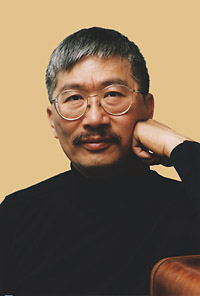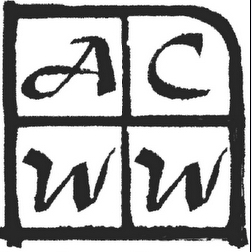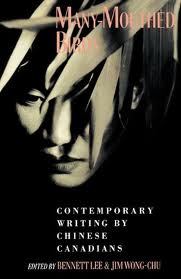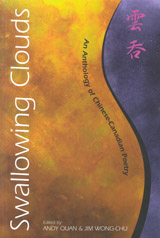Jim Wong Chu: Difference between revisions
No edit summary |
No edit summary |
||
| (20 intermediate revisions by 3 users not shown) | |||
| Line 1: | Line 1: | ||
==Jim Wong-Chu== | |||
{{AAType | {{AAType | ||
|Image=RP15.4_FeatureInterviewJWC_JUechi_photocredit_theMan.jpg | |Image=RP15.4_FeatureInterviewJWC_JUechi_photocredit_theMan.jpg | ||
|Type=Person | |Type=Person | ||
|Featured=No | |Featured=No | ||
|Arts=Arts, Literature, Poetry | |Arts=Arts, Literature, Poetry | ||
}} | }} | ||
Jim Wong-Chu (born 1949) is a poet, author, editor, and historian known as a co-founder of the Asian Canadian Writers Workshop, [http://www.asiancanadianwiki.org/w/Ricepaper_Magazine Ricepaper Magazine], anthologies of [http://www.asiancanadianwiki.org/w/Authors Asian Canadian writers] and the Vancouver | Jim Wong-Chu (born 1949) is a published poet, author, editor, and historian. He is well- known as a co-founder of the [http://asiancanadianwiki.org/w/Asian_Canadian_Writers%27_Workshop_(ACWW) Asian Canadian Writers Workshop], [http://www.asiancanadianwiki.org/w/Ricepaper_Magazine Ricepaper Magazine], Pender Guy Radio Program, Asia Canadian Performing Arts Resource (ACPAR), literASIAN: A Festival of Pacific Rim Asian Canadian Writing, and the Vancouver Asian Heritage Month Festival. He has also co-edited several anthologies of [http://www.asiancanadianwiki.org/w/Authors Asian Canadian writers]. | ||
[[File:acww.jpg|thumb|left|''[[Asian Canadian Writer's Workshop]]'']] | |||
<br> | |||
==Early Life== | |||
Born in Hong Kong, Jim Wong-Chu came to Canada in 1953 to live with his aunt and uncle as a [http://www.roadtojustice.ca/laws/chinese-exclusion-act paper son]. He returned to live with this parents in Hong Kong in 1957, but eventually settled back in Canada in 1961. After high school, he attended the Vancouver School of Art (which is now known as Emily Carr University of Art + Design) from 1975-1981, majoring in photography and design from 1975-1981. He began working at Canada Post as a letter-carrier in 1975, a position which he would hold until his retirement in 2013. | |||
'' | From 1976-1981, during his time at the Vancouver School of Art, Wong-Chu was involved with the Vancouver Co-op Radio Program on culture and assimilation, Pender Guy Radio Program. For the efforts of this group of Chinese-Canadians, the program received a 1980 Media Human Rights Award of the B'nai B'rith of Canada. From 1985-1987 he took creative writing at the University of British Columbia. | ||
<br> | |||
==Asian Canadian Literature== | |||
He is among the first authors of Asian descent with the likes of [[Sky Lee|SKY Lee]] and [[Paul Yee]] who challenged the Canadian literary establishment and questioned why it was devoid of any Asian writers. Without role models or any blueprint, the trio began to experiment with different forms of fiction and decided to not only get published but also form informal writing networks to encourage other Asian Canadians to hone their craft. His book Chinatown Ghosts (Arsenal Pulp Press, 1986; now out of print) was the first poetry book by an Asian Canadian writer. | |||
In the mid-‘60s and mid-‘70s, a lot of Asian Canadian writers were looking to get published. In the 1970s, Canada Council was supplying a lot of money to independent publishers, and there was a lack of voice coming from the Asian Canadian communities. [[Inalienable Rice|Inalieable Rice: A Chinese and Japanese Anthology]] (1979) was the most groundbreaking as the first ever Asian Canadian anthology. | In the mid-‘60s and mid-‘70s, a lot of Asian Canadian writers were looking to get published. In the 1970s, Canada Council was supplying a lot of money to independent publishers, and there was a lack of voice coming from the Asian Canadian communities. [[Inalienable Rice|Inalieable Rice: A Chinese and Japanese Anthology]] (1979) was the most groundbreaking as the first ever Asian Canadian anthology. | ||
Before Asian Canadian writing was considered a genre unto itself, one of Wong-Chu’s most critical projects took place in the library stacks of the University of British Columbia, where he went over the entire inventory of books with a fine-tooth comb, looking up literary magazines dating back 10 to 20 years. His mission in 1989 was to map all Asian Canadian writers and their material, finally compiling them into an anthology of Asian Canadian literature. Taking the twenty best works, Wong-Chu and co-editor Bennett Lee published an anthology called [[Many Mouthed Birds|Many Mouthed Birds]]. [[File:Many_mouthed_birds.jpg|thumb|right|''[[Many Mouthed Birds]]'']] | Before Asian Canadian writing was considered a genre unto itself, one of Wong-Chu’s most critical projects took place in the library stacks of the University of British Columbia, where he went over the entire inventory of books with a fine-tooth comb, looking up literary magazines dating back 10 to 20 years. His mission in 1989 was to map all Asian Canadian writers and their material, finally compiling them into an anthology of Asian Canadian literature. Taking the twenty best works, Wong-Chu and co-editor Bennett Lee published an anthology called [[Many Mouthed Birds|Many Mouthed Birds]]. [[File:Many_mouthed_birds.jpg|thumb|right|''[[Many Mouthed Birds(1991)]]'']] | ||
Responding to the lack of support for Asian Canadian arts, Wong-Chu was a co-founder of the Asian Canadian Performing Arts Resource (ACPAR) in 1995. ACPAR organized the "Go-for-Broke-Revue," presented at the Firehall Arts Centre in the fall of 1995. In 1997, the Asian Canadian Writers Workshop fundraised to establish the Emerging Writer's Award, a $4000 grant. The first recipient was Rita Wong's <i>Monkeypuzzle</i>. | |||
The publishing of this anthology created the phenomenon of Asian Canadian writing that exists today. One of the short stories included [[Wayson Choy]]'s piece, who later turned expanded into the Vancouver Book award-winning Jade Peony. In addition to co-editing Many Mouthed Birds, Wong-Chu also co-edited with [[Andy Quan]] Swallowing Clouds, published by Arsenal Pulp Press in 1999.[[File:1551520737_SwallowingClouds.jpg|thumb|left|''[[Swallowing Clouds(1999)]]'']]. | The publishing of this anthology created the phenomenon of Asian Canadian writing that exists today. One of the short stories included [[Wayson Choy]]'s piece, who later turned expanded into the Vancouver Book award-winning Jade Peony. In addition to co-editing Many Mouthed Birds, Wong-Chu also co-edited with [[Andy Quan]] Swallowing Clouds, published by Arsenal Pulp Press in 1999.[[File:1551520737_SwallowingClouds.jpg|thumb|left|''[[Swallowing Clouds(1999)]]'']]. | ||
<br> | |||
==Asian Canadian Writer's Workshop== | |||
In 1996, Jim Wong-Chu became one of the founders of the Asian Canadian Writers’ Workshop (ACWW) and moved from the basements to a formal registered not-for-profit society. Until the early ‘90s, there was not much of a critical mass of Asian Canadian writers. The university English departments were producing a lot of young people who wanted to write, so within a couple of years, about 20 members of the Asian Canadian Writers’ Workshop suddenly went up to 70 members. | In 1996, Jim Wong-Chu became one of the founders of the Asian Canadian Writers’ Workshop (ACWW) and moved from the basements to a formal registered not-for-profit society. Until the early ‘90s, there was not much of a critical mass of Asian Canadian writers. The university English departments were producing a lot of young people who wanted to write, so within a couple of years, about 20 members of the Asian Canadian Writers’ Workshop suddenly went up to 70 members. | ||
Wong-Chu started off simply, by offering workshops and then later turning its to manuscript preparation by helping young writers to find a publisher. Asian Canadian Writers’ Workshop became both an editor and agent for young emerging writers. In 1995, ACWW’s created an internal newsletter named [[Ricepaper Magazine]]. Wong-Chu was interested in creating a body of literature to legitimize and create an Asian Canadian genre that could be put into a library. Ricepaper continues strong in its eighteen years as a quarterly publication featuring new and existing Asian Canadian writers. | Wong-Chu started off simply, by offering workshops and then later turning its to manuscript preparation by helping young writers to find a publisher. Asian Canadian Writers’ Workshop became both an editor and agent for young emerging writers. In 1995, ACWW’s created an internal newsletter named [[Ricepaper Magazine]]. Wong-Chu was interested in creating a body of literature to legitimize and create an Asian Canadian genre that could be put into a library. Ricepaper continues strong in its eighteen years as a quarterly publication featuring new and existing Asian Canadian writers. | ||
In 1996, Jim Wong-Chu along with Mishtu Banerjee, Mo-Ling Chui, Grace Eiko Thomson, and Winston Xin formed the Vancouver Asian Heritage Month Society, as an organization that endeavoured to explore the diversity of Asian Canadian life and culture and promote the discussion of relevant issues and concerns within and beyond the Asian Canadian community. | In 1996, Jim Wong-Chu along with Mishtu Banerjee, Mo-Ling Chui, Grace Eiko Thomson, and Winston Xin formed the Vancouver Asian Heritage Month Society, as an organization that endeavoured to explore the diversity of Asian Canadian life and culture and promote the discussion of relevant issues and concerns within and beyond the Asian Canadian community. | ||
In 2011, Wong-Chu sat on an independent jury to select the winners of the 2011 City of Vancouver Book Award. | |||
==List of Awards== | |||
* Queen's Diamond Jubilee Medal (2013) | |||
* Queen's Golden Jubilee Medal, Department of Canadian Heritage | |||
* Canada Post Silver Postmark Award | |||
* Media Human Rights Award of the B'nai B'rith of Canada (1980) | |||
==Partial List of Literary Works== | |||
* Inspection of a House Paid in Full (author) | |||
* Chinatown Ghosts (author) | |||
* A Brief History of Asian North America (author) | |||
* Strike the Wok: An Anthology of Contemporary Chinese Fiction (co-author) | |||
* Inalienable Rice: A Chinese and Japanese Canadian Anthology (contributor) | |||
* Many-Mouthed Birds: Contemporary Writing by Chinese Canadians (co-editor) | |||
* Millennium Messages: An Anthology of Asian Canadian Writing (contributor) | |||
* Swallowing Clouds: An Anthology of Chinese-Canadian Poetry (co-editor) | |||
==List of Exhibitions and Photograph Publications== | |||
* The B.C. Photographer (publication), Mainstream (publication) | |||
* Asianadian (publication), Inalienable Rice: A Chinese and Japanese Anthology (book) | |||
* Yellow Peril: New World Asians (exhibit). | |||
{{#widget:YouTube|width=220|id=j-eOoj4hqvM|ACWW: Jim Wong-Chu at literASIAN launch}} | {{#widget:YouTube|width=220|id=j-eOoj4hqvM|ACWW: Jim Wong-Chu at literASIAN launch}} | ||
Latest revision as of 10:02, 28 December 2017
Jim Wong-Chu[edit]
Arts Literature Poetry Person
Jim Wong-Chu (born 1949) is a published poet, author, editor, and historian. He is well- known as a co-founder of the Asian Canadian Writers Workshop, Ricepaper Magazine, Pender Guy Radio Program, Asia Canadian Performing Arts Resource (ACPAR), literASIAN: A Festival of Pacific Rim Asian Canadian Writing, and the Vancouver Asian Heritage Month Festival. He has also co-edited several anthologies of Asian Canadian writers.
Early Life[edit]
Born in Hong Kong, Jim Wong-Chu came to Canada in 1953 to live with his aunt and uncle as a paper son. He returned to live with this parents in Hong Kong in 1957, but eventually settled back in Canada in 1961. After high school, he attended the Vancouver School of Art (which is now known as Emily Carr University of Art + Design) from 1975-1981, majoring in photography and design from 1975-1981. He began working at Canada Post as a letter-carrier in 1975, a position which he would hold until his retirement in 2013.
From 1976-1981, during his time at the Vancouver School of Art, Wong-Chu was involved with the Vancouver Co-op Radio Program on culture and assimilation, Pender Guy Radio Program. For the efforts of this group of Chinese-Canadians, the program received a 1980 Media Human Rights Award of the B'nai B'rith of Canada. From 1985-1987 he took creative writing at the University of British Columbia.
Asian Canadian Literature[edit]
He is among the first authors of Asian descent with the likes of SKY Lee and Paul Yee who challenged the Canadian literary establishment and questioned why it was devoid of any Asian writers. Without role models or any blueprint, the trio began to experiment with different forms of fiction and decided to not only get published but also form informal writing networks to encourage other Asian Canadians to hone their craft. His book Chinatown Ghosts (Arsenal Pulp Press, 1986; now out of print) was the first poetry book by an Asian Canadian writer.
In the mid-‘60s and mid-‘70s, a lot of Asian Canadian writers were looking to get published. In the 1970s, Canada Council was supplying a lot of money to independent publishers, and there was a lack of voice coming from the Asian Canadian communities. Inalieable Rice: A Chinese and Japanese Anthology (1979) was the most groundbreaking as the first ever Asian Canadian anthology.
Before Asian Canadian writing was considered a genre unto itself, one of Wong-Chu’s most critical projects took place in the library stacks of the University of British Columbia, where he went over the entire inventory of books with a fine-tooth comb, looking up literary magazines dating back 10 to 20 years. His mission in 1989 was to map all Asian Canadian writers and their material, finally compiling them into an anthology of Asian Canadian literature. Taking the twenty best works, Wong-Chu and co-editor Bennett Lee published an anthology called Many Mouthed Birds.
Responding to the lack of support for Asian Canadian arts, Wong-Chu was a co-founder of the Asian Canadian Performing Arts Resource (ACPAR) in 1995. ACPAR organized the "Go-for-Broke-Revue," presented at the Firehall Arts Centre in the fall of 1995. In 1997, the Asian Canadian Writers Workshop fundraised to establish the Emerging Writer's Award, a $4000 grant. The first recipient was Rita Wong's Monkeypuzzle.
The publishing of this anthology created the phenomenon of Asian Canadian writing that exists today. One of the short stories included Wayson Choy's piece, who later turned expanded into the Vancouver Book award-winning Jade Peony. In addition to co-editing Many Mouthed Birds, Wong-Chu also co-edited with Andy Quan Swallowing Clouds, published by Arsenal Pulp Press in 1999.
.
Asian Canadian Writer's Workshop[edit]
In 1996, Jim Wong-Chu became one of the founders of the Asian Canadian Writers’ Workshop (ACWW) and moved from the basements to a formal registered not-for-profit society. Until the early ‘90s, there was not much of a critical mass of Asian Canadian writers. The university English departments were producing a lot of young people who wanted to write, so within a couple of years, about 20 members of the Asian Canadian Writers’ Workshop suddenly went up to 70 members.
Wong-Chu started off simply, by offering workshops and then later turning its to manuscript preparation by helping young writers to find a publisher. Asian Canadian Writers’ Workshop became both an editor and agent for young emerging writers. In 1995, ACWW’s created an internal newsletter named Ricepaper Magazine. Wong-Chu was interested in creating a body of literature to legitimize and create an Asian Canadian genre that could be put into a library. Ricepaper continues strong in its eighteen years as a quarterly publication featuring new and existing Asian Canadian writers.
In 1996, Jim Wong-Chu along with Mishtu Banerjee, Mo-Ling Chui, Grace Eiko Thomson, and Winston Xin formed the Vancouver Asian Heritage Month Society, as an organization that endeavoured to explore the diversity of Asian Canadian life and culture and promote the discussion of relevant issues and concerns within and beyond the Asian Canadian community.
In 2011, Wong-Chu sat on an independent jury to select the winners of the 2011 City of Vancouver Book Award.
List of Awards[edit]
- Queen's Diamond Jubilee Medal (2013)
- Queen's Golden Jubilee Medal, Department of Canadian Heritage
- Canada Post Silver Postmark Award
- Media Human Rights Award of the B'nai B'rith of Canada (1980)
Partial List of Literary Works[edit]
- Inspection of a House Paid in Full (author)
- Chinatown Ghosts (author)
- A Brief History of Asian North America (author)
- Strike the Wok: An Anthology of Contemporary Chinese Fiction (co-author)
- Inalienable Rice: A Chinese and Japanese Canadian Anthology (contributor)
- Many-Mouthed Birds: Contemporary Writing by Chinese Canadians (co-editor)
- Millennium Messages: An Anthology of Asian Canadian Writing (contributor)
- Swallowing Clouds: An Anthology of Chinese-Canadian Poetry (co-editor)
List of Exhibitions and Photograph Publications[edit]
- The B.C. Photographer (publication), Mainstream (publication)
- Asianadian (publication), Inalienable Rice: A Chinese and Japanese Anthology (book)
- Yellow Peril: New World Asians (exhibit).
{{#widget:YouTube|width=220|id=j-eOoj4hqvM|ACWW: Jim Wong-Chu at literASIAN launch}}



